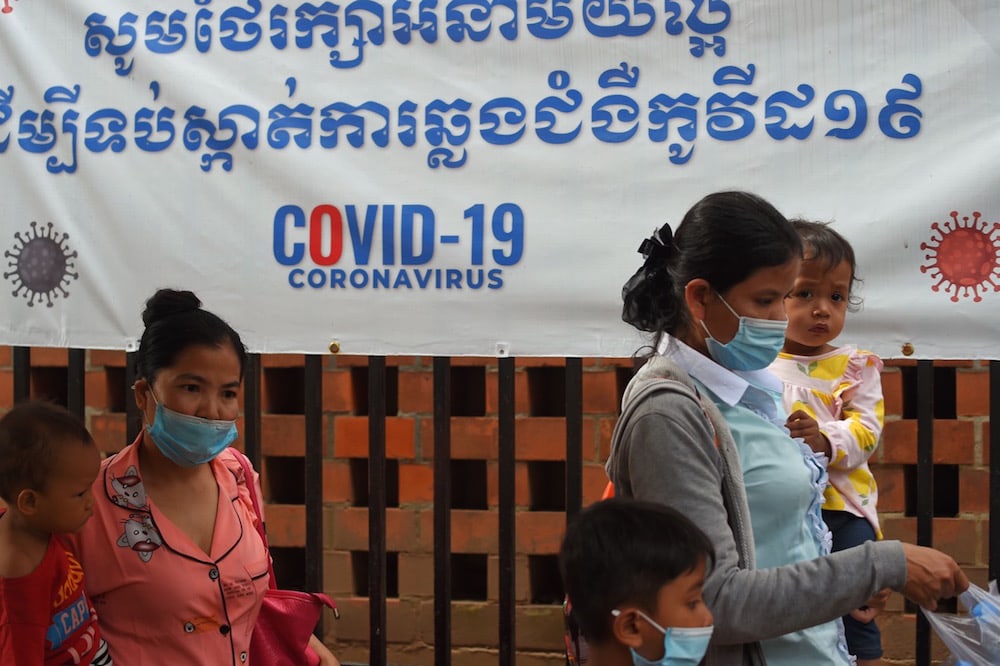Several civil society groups have warned that women and children are at risk of abuse in quarantine centers or at home as some areas in the Cambodian capital of Phnom Penh are placed under lockdown.
This statement was originally published on cchrcambodia.org on 16 April 2021.
We, the undersigned civil society organizations, are deeply concerned about the heightened risks of gender-based violence that the COVID-19 pandemic poses. We call on all relevant officials of the Royal Government of Cambodia (RGC) to increase their vigilance and take action to prevent all forms of violence against women, children and LGBT+ individuals that may occur during mandatory quarantine and in areas under lockdown.
On 9 April, the RGC put some areas of Phnom Penh in lockdown, including Khan Meanchey, Khan Sen Sok, and Khan Por Senchey. The government also recently decided to place Phnom Penh in lockdown for two weeks effective from midnight on 14 April. Lockdown measures similarly began today in several communes of Siem Reap city. All people are requested to implement the “3 dos, 3 don’ts” to control of the spread of the COVID-19 virus.
At the same time, the RGC has set up additional quarantine centers in the provinces and in Phnom Penh to tackle the increase in COVID-19 cases. For instance, a quarantine center has been set up at Trom Chreung Primary School for 457 workers of the AM2 factory, as well as a COVID-19 treatment and quarantine facility at Chea Sim Samaki High School. A wedding party hall has also been set up as a field hospital.
While quarantine measures are important to curb the spread of COVID-19, they can also have psychological and social consequences, notably a rise in gender-based violence. According to the experiences of many counties who have faced the COVID-19 pandemic, several factors can contribute to the increase in gender-based violence, including the financial hardship faced by households and their limited capacity to adapt to their new situation, tension and stress during quarantine, drug and alcohol use, crowded spaces at field hospitals and quarantine centers or the inaccessibility of households in lockdown areas, during the social focus of fighting against COVID-19.
Women, children and LGBT+ individuals are among the most at-risk groups in society, even more so during crises such as the COVID-19 pandemic. COVID-19-related stressors can lead parents to neglect or mistreat their children at home, and this harm to children may be exacerbated by the limited scope of intervention of NGOs working on child support during outbreaks. Children may also face heightened stress and anxiety when prevented from going out. Women may be exposed to increased levels of violence by their intimate partners when they are stuck at home due to lockdowns and face challenges earning an income. Women and children are also at a risk of abuse in quarantine centers or at home in lockdown areas, which may be conducive environments for gender-based violence due to a lack of understanding and limited intervention by authorities. Similarly, LGBT+ individuals are more likely to suffer from stigma and discrimination as well as abuse in quarantine facilities.
In this context, we, the undersigned civil society organizations, appeal to all the relevant government officials to increase vigilance in order to prevent gender-based violence by:
- Making the prevention of gender-based violence a priority in responding to COVID-19, especially in quarantine facilities and areas under lockdown, and providing essential services to victims of such violence. This should include encouraging the issuance of protection orders and administrative decisions where appropriate, and providing safe spaces for women and children where their primary home is unsafe for them to self-quarantine;
- Increasing awareness among authorities and the public about discrimination and gender-based violence and the legal framework as well as complaint procedures, particularly the need to erase the stigma against those who report violence;
- Continuing to ensure sufficient space, safety and privacy for all people in quarantine fields, including designated sleeping areas for women and men or families;
- Supporting and encouraging the elimination of discrimination, stigma and barriers that prevent women from reporting violence against them ;
- Developing new approaches such as the use of messaging applications and other mobile technology to enable reporting of cases of violence against women, children and LBGTQ individuals;
- Increasing the distribution of hotline numbers, especially to receive reports by victims or witnesses;
- Supporting the work of NGOs, international organizations, and development partners to reduce and respond to GBV;
- Setting advanced mechanisms for referral and measurement to respond when violence is reported.
This statement is endorsed by:
1. RHAC
2. The Cambodian NGO Committee on CEDAW (NGO-CEDAW)
3. Cambodian Center for Human Rights (CCHR)
4. Committee for Free and Fair Elections in Cambodia (COMFREL)
5. Klahaan Organization (KLAHAAN)
6. Cambodian Health and Education for Community (CHEC)
7. Association of Domestic Workers (ADW)
8. Association to Support Vulnerable Women (ASVW)
9. Cambodia Labor Confederation (CLC)
10. Garden of Hope in Cambodia
11. Gender and Development for Cambodia (GADC)
12. Gender and Development Network (GADnet)
13. Women Peace Makers (WMP)
14. ARV Users Association (AUA)
15. EMDR Cambodia
16. Banteay Srei (BS)
17. Neutral and Impartial Committee for Free and Fair Elections in Cambodia (NICFEC)
18. Coalition of Cambodia Farmers Community (CCFC)
19. ActionAid Cambodia (AAC)
20. Cambodian Food and Service Workers’ Federation (CFSWF)
21. Cambodian League for the Promotion and Defense of Human Rights (LICADHO)
22. Independent Democracy of Informal Economy Association (IDEA)
23. Urban Poor Women Development (UPWD)
24. Lady Saving Group (LSG)



